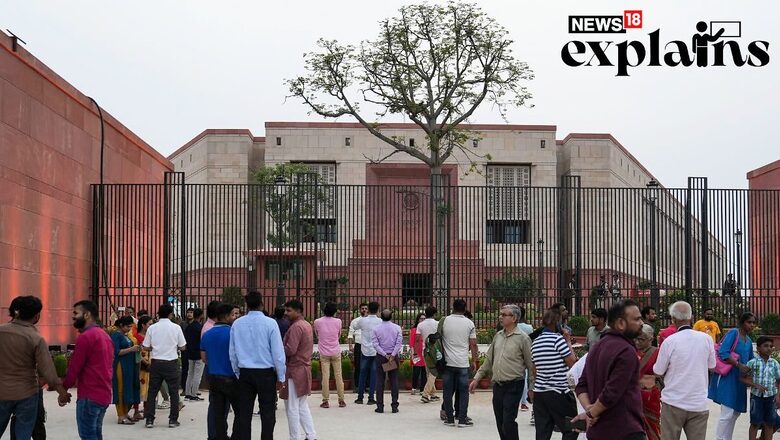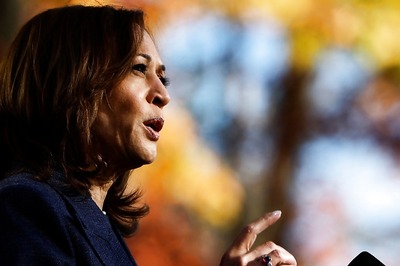
views
The centre on Thursday introduced the Chief Election Commissioner and Other Election Commissioners (Appointment, Conditions of Service and Term of Office) Bill, 2023 which would put in place a new system of appointment of Chief Election Commissioner (CEC) and Election Commissioners.
This bill assumes significance in the context of the apex court judgment passed in March 2023. Here is all you need to know about the new bill and how were the appointments made in the election body as of now.
What was the SC Judgement?
The Supreme Court in a judgment on March 2 related to the appointment of the Chief Election Commissioner (CEC) and Elections Commissioners (ECs) held that the President will appoint these officials on the advice of a committee consisting of the prime minister, leader of the opposition in the Lok Sabha and the Chief Justice of India (CJI).
The judgement by the SC bench led by Justice KM Joseph came in response to a PIL filed in 2015, challenging the constitutional validity of the practice of the Centre-appointed members of the EC.
The judgment was passed by a five-judge constitution bench headed by Justice KM Joseph, who held that this norm would continue to be in effect until a law on the issue is enacted by Parliament.
What the New Bill States?
The Bill doesn’t include the Chief Justice of India (CJI) in the committee that will advise on the appointment of the Chief Election Commissioner (CEC) and Elections Commissioners (ECs).
The Bill envisages that the CEC and ECs shall be appointed from among people who are holding or have held the post equivalent to Secretary to the Government of India and shall be persons of integrity, who have knowledge of and experience in management and conduct of elections.
According to the Bill, a ‘Search Committee’, headed by the Cabinet Secretary and comprising two members not below the rank of Secretary having knowledge and experience in matters relating to elections, shall prepare a panel of five persons for consideration of the ‘Selection Committee’ for appointment of CEC and ECs.
The ‘Selection Committee will consist of the prime minister as a chairman, the leader of the opposition as the member, and a union cabinet minister nominated by the prime minister as a second member.
How were the Selection Made?
Currently, the appointments of Chief Election Commissioner and the Elections Commissioners are governed by Article 324(2) of the Constitution which states, “The Election Commission shall consist of the Chief Election Commissioner and such number of other Election Commissioners, if any, as the President may from time to time fix and the appointment of the Chief Election Commissioner and other Election Commissioners shall, subject to the provisions of any law made in that behalf by Parliament, be made by the President”.
The CEC and ECs hold the office for a term of six years or until they attain the age of 65 years whichever is earlier.
The conditions of service of the officers of the election body are governed by the Election Commission (Conditions of Service of Election Commissioners and Transaction of Business) Act, 1991 (EC Act).
To ensure the independence of the CEC and ECs security of tenure has been ensured to them. Article 324 (5) makes it clear that the Chief Election Commissioner shall not be removed from his office except in like manner and on the like grounds as a Judge of the Supreme Court and the conditions of service of the Chief Election Commissioner shall not be varied to his disadvantage after his appointment. Other Election Commissioner or a Regional Commissioner shall not be removed from office except on the recommendation of the Chief Election Commissioner.
All About Election Commission
Election Commission is one of the most important constitutional bodies that constitution makers envisaged. Its importance lies in the fact that it is tasked with conducting free and fair elections that forms the bedrock of a democratic polity.
Till 15 October 1989, the Election Commission worked as a single-member body consisting of the Chief Election Commissioner. It was on October 16, 1989, that the President appointed two other commissioners to give an extra hand to the election body as there was a sudden increase in its workload as the voting age was reduced from 21 to 18 years and the number of voters increased significantly.
The commission worked as a three-member body until January 1990 when two Elections Commissioners (ECs) posts were abolished. In October 1993, the President appointed two more Elections Commissioners (ECs) and since then the Election Commission has worked as a three-member body.
However, the CEC and ECs have equal powers and receive equal remuneration which matches that of a Supreme Court judge. If any difference of opinion on any matter arises between the three members it is decided by the majority.
Speaking on the provisions related to the Election Commission, Dr BR Ambedkar said in the constituent assembly that “the whole election machinery should be in the hands of a Central Election Commission, which alone would be entitled to issue directives to returning officers, polling officers and others.”
As the constitution has not laid down a specific legislative process for the appointment of the CEC and ECs, the appointments till date were made by the President on the advice of the Union Council of Ministers headed by the Prime Minister.
With the new bill, any ambiguity over who has the final say in the appointments of the CEC and ECs will be made clear.




















Comments
0 comment